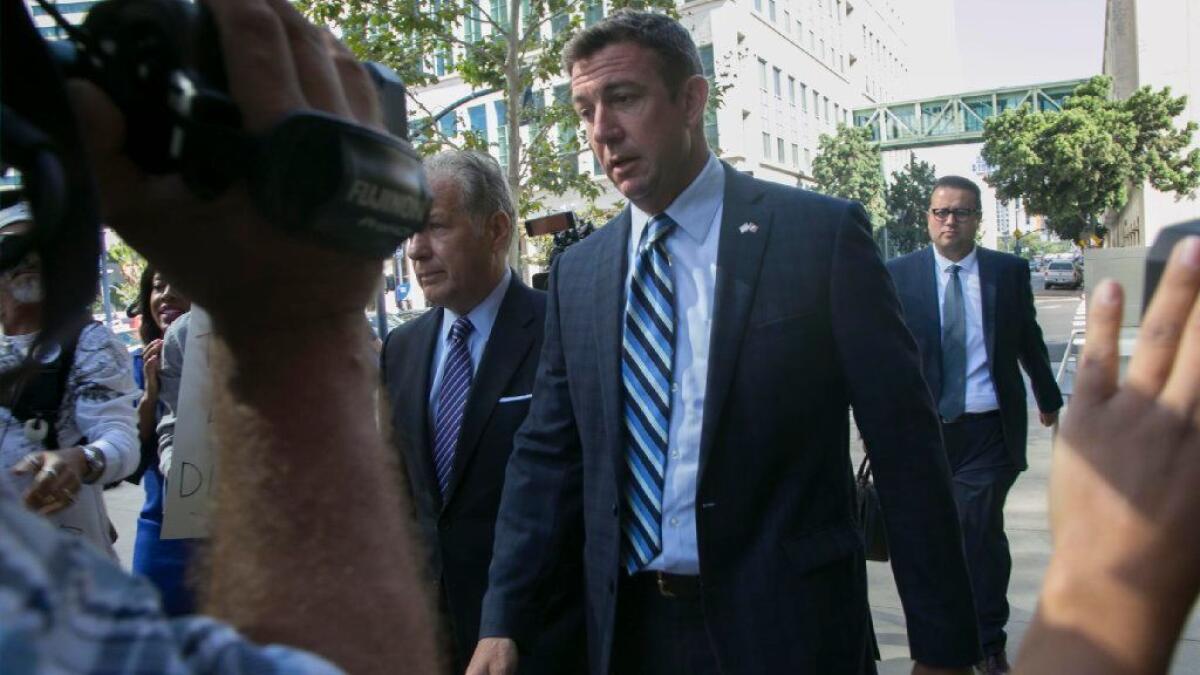Beyond the deep state witch hunt, Duncan Hunter defense could focus on election law ‘gray areas’

- Share via
Reporting from San Diego — In the days since federal prosecutors dropped a sweeping indictment on Rep. Duncan Hunter (R-Alpine) and his wife, accusing them of using $250,000 in campaign money for personal expenses, the congressman and his lawyer publicly launched two lines of defense — attacking prosecutors and blaming Margaret Hunter.
The accusation that the indictment was a politically motivated product of a deep state conspiracy inside the Justice Department, and Hunter’s contention about his wife in an interview that “whatever she did, that’ll be looked at, too, I’m sure, but I didn’t do it” have received the most attention.
But a larger legal defense was outlined in letters sent to Justice Department officials by Duncan Hunter’s lawyer, Gregory Vega, in the weeks before the indictment.
In the July 30 and Aug. 6 letters, Vega argued that federal prosecutors had misinterpreted the law, were turning civil law violations into crimes and had rushed to indict his client.
In an Aug. 6 letter to Deputy Atty. Gen. Rod Rosenstein, Vega asked for a meeting with senior Justice Department officials to head off an indictment. Vega said he would contend that the charges he anticipated the Hunters would face “reflect an overly aggressive prosecution intent on criminalizing conduct that is civil in nature.”
He questioned whether prosecutors had consulted with election experts or the Federal Election Commission.
“Any such consultation would have confirmed that supposedly ‘criminal’ transactions involving the Congressman actually fall into FEC gray areas or are altogether permissible,” Vega wrote.
He did not provide specifics in the letter, but several lawyers and legal experts said that, in light of the details laid out in the 47-page indictment, it would be a hard case for Vega to make.
“I don’t really see a lot of gray area here,” said Paul Seamus Ryan, a campaign law expert and vice president for policy and litigation at Common Cause in Washington, D.C. “There appears to me to be an awful lot of expenses that the Hunters were indicted for that aren’t allowed by the FEC, and aren’t close calls at all.”
The Hunters have pleaded not guilty to the charges, which include bank fraud, conspiracy and falsifying campaign finance records. The indictment alleges the couple diverted campaign contributions to pay for trips, meals, golf outings, video games and all manner of everyday living expenses.
Neither Vega nor Margaret Hunter’s lawyer responded to requests for comment.
The defense’s claims that prosecutors are turning civil or administrative law violations into crimes or are misinterpreting evidence aren’t new. But, given the depth and breadth of the indictment against the Hunters, it would be a tough sell, said Jerry Coughlan, a former federal prosecutor.
Coughlan noted that Vega’s letter doesn’t specify where the gray areas are, nor cite specific shortcomings of prosecutors. He also said that the decision to pursue criminal charges over civil or administrative penalties is usually based on how egregious the conduct is.
The indictment lists in exacting detail some 200 instances in which the couple allegedly converted campaign funds for living expenses.
“The indictment’s specificity itself shows why prosecutors would choose to use the criminal process and not defer to civil or administrative remedies,” Coughlan said.
Vega’s letters also contended the San Diego prosecutor’s office should be recused because of a supposed conflict caused when two prosecutors — including one who helped bring the indictment — attended a fundraiser in August 2015 for Hillary Clinton. He further argued that the filing of the indictment after the June primary, and just before the November election in which Hunter is being challenged, was done for partisan political advantage and violated DOJ policies about not interfering in elections.
Vega, a Democrat who served as U.S. attorney in San Diego under an appointment by President Clinton, said charging Hunter would “politicize the democratic process.”
DOJ policy, first formulated in 2008 and reaffirmed in 2012 by then-Atty. Gen. Eric H. Holder Jr. in a memo titled “Election Year Sensitivities,” does not outright ban filing charges against candidates close to an election. It warns that politics should “play no role in the decision of federal investigators” when it comes to either opening a probe or filing charges.
San Diego defense lawyer Eugene Iredale said the policy is meant to prevent federal agents from acting in a way that is obviously political, and that prosecutors are open to criticism any time an elected official is the subject of an investigation.
“What are they supposed to do? If they indicted six months before the election a candidate would say it’s obviously political, they don’t want me to get elected,” Iredale said. “If they did it two months after they would say it’s obviously political because now that I was elected they are trying to get me out of office.”
Moran writes for the San Diego Union-Tribune.
More to Read
Sign up for Essential California
The most important California stories and recommendations in your inbox every morning.
You may occasionally receive promotional content from the Los Angeles Times.











